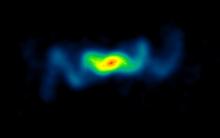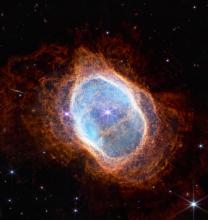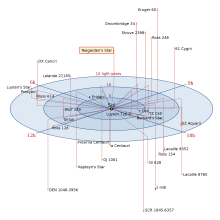Listen to today's episode of StarDate on the web the same day it airs in high-quality streaming audio without any extra ads or announcements. Choose a $8 one-month pass, or listen every day for a year for just $30.
You are here
Sigma Scorpii
The celestial scorpion curves above the southern horizon as night falls on summer evenings, with the bright orange star Antares as its bright heart.
Antares is one of the most impressive stars in the galaxy — a supergiant that’s destined to explode as a supernova. But a fainter star that stands close to its right is pretty impressive, too. Sigma Scorpii consists of four stars, at least one of which will also end its life with a giant bang.
Two of Sigma Scorpii’s stars form a tight pair — their surfaces are separated by about half the distance from Earth to the Sun. They’re so close together that even the biggest telescopes see them as a single pinpoint of light. But instruments that break the light into its individual wavelengths detect the presence of two stars, not one.
Both stars are much bigger, brighter, and heavier than the Sun. Their details have proved a bit elusive, but a recent study found that the dominant member of the pair is about 14 times as massive as the Sun and about eight times the Sun’s diameter. Its companion is smaller and lighter, but still a stunner.
The heavier star is almost certain to explode as a supernova sometime in the next few million years. But the companion’s fate is less certain. The star is near the mass limit for a star that will become a supernova. Above that limit, it goes boom. Below it, the star sheds its outer layers, leaving its hot, dense core — a dead star known as a white dwarf.
Script by Damond Benningfield





